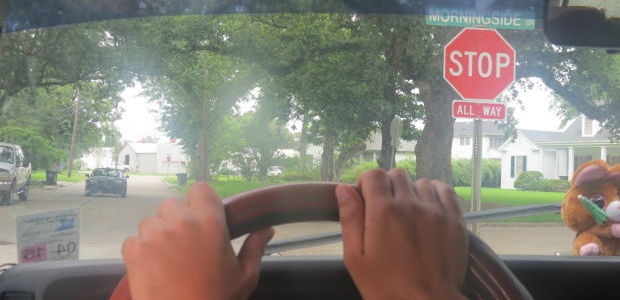SL’s Rhodes signs scholarship
June 11, 2013Entrepreneur fest kicks off Thursday
June 11, 2013Louisiana lawmakers envisioned it as a tool that would help protect the state and the nation from terrorists in the wake of the devastating 2001 terror attacks in New York and Washington.
But attorneys for immigrants say the law making it illegal to drive in Louisiana “without a lawful presence” in the U.S. has been twisted and turned, used instead to harass and terrorize people accused of being here without proper documentation or legal status.
And some of those attorneys say Terrebonne and Lafourche are among the parishes where that application appears more common. Opponents of the law say it amounts to a charge of “driving while Mexican” suggesting it as an open door to racial profiling by police. But local law enforcement officials say their officers have not used it as a primary charge, and that it tends to get tacked on to other traffic charges after officers have made a stop on the basis of what they determine to be probable cause. In other words, since the law is on the books, the charge gets filed if an arrest is made for some other violation
A mid-level appeals court has already moved to invalidate the statute. Now, the Louisiana Supreme Court gets its turn to weigh in. While the justices have not set a date for argument, they have agreed to hear the case, which could draw national attention due to a string of immigration-related cases.
The most significant of these concern Joe Arpeio, the controversy-bathed sheriff of Maricopa County, Ariz.
A federal judge ruled last month that Arpeio’s zealous enforcement of immigration-related laws crossed a line, assigning federal level immigration enforcement to a local agency in violation of the US Constitution’s supremacy clause.
Through this month Arpeio has suspended his immigration enforcement, pending a hearing.
Local forays into the immigration enforcement rubric have been less than satisfying.
“It’s not a primary violation, like speeding or violating a stop sign,” said Lafourche Parish Sheriff Craig Webre. His officers have brought the charge about a half dozen times in the past few years, according to a check of records by department spokesman Brennan Matherne.
In Terrebonne Parish, Sheriff Jerry Larpenter likewise said his officers have rarely used the statute.
“If anyone is driving illegally, they will have to face the consequences,” said Larpenter. “We aren’t arresting them for that because (U.S.) immigration doesn’t come get them.”
Terrebonne Assistant District Attorney Carlos Lazarus agrees.
“As a practical matter, it becomes impossible to prove,” Lazarus said, referring to the difficulty local agencies have getting the required information from Immigration and Customs Enforcement.
When State v. Bonifacio Ramirez and State v. Marquez reach the Supreme Court, justices will be reading briefs opposing the law prepared by prominent national civil rights organizations.
The Southern Poverty Law Center, the National Immigration Law Center, the American Civil Liberties Union Foundation Immigrants’ Rights Project and the American Civil Liberties Union Foundation of Louisiana filed briefs as friends-of-the-court.
The law, according to those advocates, has put foreign exchange students and construction workers rebuilding the state after hurricanes Katrina, Isaac and Rita at risk of felony convictions “for doing nothing more than driving a car.”
“This law is clearly unconstitutional and places a tremendous burden on citizens and non-citizens alike,” said Law Center staff attorney Meredith Stewart. “As federal lawmakers are working hard to fix our broken immigration system, such state attempts at regulating immigration are unproductive and are a drain on local law enforcement resources. We urge the Louisiana Supreme Court to find the law unconstitutional.”
The law, called “operating a vehicle without lawful presence,” makes it a felony for immigrants to drive a vehicle without carrying proof that they are lawfully present in the United States. The Louisiana State Legislature enacted the law shortly after 9/11 as a purported anti-terrorism measure.
Advocates say the law has not been used to prosecute terrorists, however “but rather to criminalize even lawful immigrants, and to harass U.S. citizens who may look or sound foreign.”
“Judging people by how they look is un-American and against the law, and that is exactly what this misguided law requires,” said Marjorie R. Esman, ACLU Foundation of Louisiana executive director. “It imposes criminal penalties on those who can’t provide documents on demand, without any other basis for suspicion. There is a good reason that similar laws in other states have been struck down. The people of Louisiana deserve better than this.”
The writing on the wall for Louisiana’s statute appeared in 2012, when the U.S. Supreme Court ruled that key components of a similar Arizona law were unconstitutional and preempted by federal immigration law.
What makes the Louisiana law particularly problematic, advocates say, is that violations are classified as felonies.
The way the advocates explain it, the Louisiana law oversteps into federal territory because it dictates the circumstances under which immigrants must carry documents relating to their legal status in the U.S.
“The law also allows state and local law enforcement agencies and state courts to determine and adjudicate an individual’s immigration status,” a joint statement from the advocacy organizations reads. “Individuals who are deemed by a state or local law enforcement officer to be unlawfully present are subject to arrest and risk a felony conviction.”
Although local law enforcement officials maintain the law is not a tool that helps them accomplish desired goals, their jurisdictions are seen as making the most use of it compared to some others.
Jaesa McLin, an immigration attorney with the Riguer Silva law firm of New Orleans, who works in its Kenner office, says she sees more cases from parishes in this area.
“We see far more in Terrebonne and Lafourche than in Jefferson Parish,” she said.
One of her clients who was arrested because of the law in question was, McLin said, married to a U.S. citizen. They have a child together, who is in all respects a U.S. citizen.
“This young man is now in removal proceedings,” she said, explaining that after his arrest on the Louisiana charge he was turned over to immigration authorities. “After they have a plea deal they are transferred to immigration custody.”
When some local jurisdictions arrest someone on the driving without lawful presence charge, McLin said, there is often confusion on the part of local authorities as to what they should do next.
Federal regulations, she said, allow immigration officials 48 hours to pick the person up. After that, she said, the person should be released.
But in many cases local law enforcement agencies have said they are waiting for an “immigration hold” which, according to the law, does not exist.
In some cases, this has resulted in people being held indefinitely in local jails because – as Larpenter, Webre and other officials note – immigration authorities don’t ever arrive.
McLin is not aware of any such cases specifically in Terrebonne or Lafourche, however.
Any cases that do exist – no matter the parish – are seen as particularly problematic by advocates because Louisiana’s law classifies violators as felons.
“The law before the Louisiana Supreme Court provides a perfect example of an unworkable – and unconstitutional – state attempt to meddle in strictly federal immigration territory,” said Karen Tumlin, the National Immigration Law Center’s managing attorney. “As the rest of the nation drives toward immigration reform, Louisiana should not be stuck in reverse.”
Attorneys for immigrants say the law making it illegal to drive in Louisiana “without a lawful presence” has been twisted and turned, and is used instead to harass and terrorize people accused of being in the United States without proper documentation or legal status.











